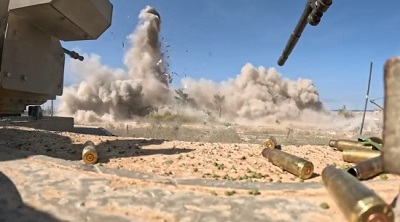New Delhi, (Samajweekly) As the Gaza conflict enters its 66th day, the last week saw a US veto on a UNSC resolution, Washington approving an emergency sale of $106 million worth of tank ammunition to support Israel’s military actions, GCC nations holding a special session on the issue in Doha, while countries like Spain continue to support the Palestinian cause in face of mounting criticism at home.
A report published by the WHO on Sunday speaks volumes about the ground situation in Gaza.
WHO Director-General, Tedros Adhanom Ghebreyesus, said that it would be hard to meet the world body’s Executive Board’s requests for immediate humanitarian relief in Gaza, besides a ground report, during a special WHO session, given the security situation on the ground, he said he deeply regretted that the UNSC could not agree on a ceasefire following a US veto.
“Resupplying health facilities has become extremely difficult and is deeply compromised by the security situation on the ground and inadequate resupply from outside Gaza,” he said.
Meanwhile, UN Secretary-General Antonio Guterres has promised not to “give up” on urging the Security Council to press to avert a humanitarian catastrophe and reiterated his appeal for a cease-fire to be declared.
“Regrettably, the Security Council failed to do it, but that does not make it less necessary. So, I can promise I will not give up,” Guterres said during remarks at the opening session of the Doha Forum in Qatar, on Sunday.
Qatar’s Emir Sheikh Tamim bin Hamad said: “It is unfortunate that, despite the disclosure of the scale of the crime, and the outbreak of public protests that took to the streets all over the world, some official circles still see the Palestinian people as ineligible for demanding a ceasefire.”
Palestinian Prime Minister Mohammad Ishtaye called for holding Israel accountable, imposing sanctions, and halting it from continuing to violate international laws, calling for an urgent investigation into its crimes against the Palestinian people.
Jordanian Foreign Minister Ayman Safadi warned that the continuation of the war will drag the region into an all-out conflict, and said what is happening in Gaza could be described as a systematic act to expel the population and Israeli calls to “wipe out” the Palestinians.
He called on the US to ramp up more pressure on Israel to halt its crimes in Gaza, adding that Israel defies the world, violates international law, and perpetrates war crimes and genocide.
Qatar’s Emir and Prime Minister and Minister of Foreign Affairs Sheikh Mohammed bin Abdulrahman held a number of bilateral meetings on the sidelines of the Qatar Forum with senior UN officials, heads of states and ministers attending the two-day event to discuss the Gaza war and ways to continue efforts to provide aid, release hostages and end the fighting.
Over two million Palestinians are trapped in Gaza, facing increased bombardment even in designated “safe zones”. Palestinians released from Israeli detention allege abuse during a recent round up of men.
The death toll in Gaza surpasses 17,700, with hospitals receiving bodies from recent bombings. Nearly 85 per cent of Gaza’s 2.3 million people have been displaced within the besieged territory, where UN agencies say there is no safe place to flee.
Meanwhile, the last week, saw a plethora of diplomatic flurry led by Qatar, as the Israeli position seems to becoming more rigid and not pliable at all.
At the Gulf Cooperation Council (GCC) meeting in Doha on December 5, Qatar’s ruler Sheikh Tamim bin Hamad Al-Thani hit out at “shameful” international inaction over the Israeli aggression against Gazans.
Qatar’s Foreign Ministry said that GCC summit was aimed at forming a united approach to end the aggression in Gaza.
A week-long truce between Israel and Hamas, which collapsed on December 8, had been brokered by Qatar and other mediators to allow the release of captives taken by Hamas in October, in exchange for Palestinian prisoners held by Israel, often without charge.
Sheikh Tamim said that while his country was still working to renew a truce, it was not an “alternative to a permanent ceasefire”.
Speaking at the summit, Turkish President Recep Tayyip Erdogan said: “Israel’s war crimes and its crimes against humanity in Gaza should not be left unanswered.”
He added that Turkey’s priority is to “ensure that a permanent ceasefire is implemented in Gaza and humanitarian aid is delivered without any interruption”.
It seems that Qatar and Turkey are the two most vocal critics of the Israeli regime in the current conflict. And Qatar is playing its part as a mediator more than what is expected of a mediator.
Meanwhile, amid Israel’s onslaught of Gaza, Spain has become the latest country to have started a diplomatic tussle with Israel, besides showing empathy for Palestine. Spain, which has long supported Palestine in the on-going conflict, has upset Israel with its consistent condemnation od Israeli actions.
Last week, as images of child victims and bombed-out buildings flooded social media, Spanish Prime Minister Pedro Sanchez said given “the footage we are seeing and the growing numbers of children dying, I have serious doubts (Israel) is complying with international humanitarian law”.
“What we are seeing in Gaza is not acceptable,” he added.
Sanchez’s words prompted a swift response from Israel, which reprimanded the Spanish Ambassador to Jerusalem and withdrew its own diplomat from Madrid.
The Spanish leader, who has also condemned Hamas for its assault, is the highest-ranking and most well known European official to condemn Israel, joined only by politicians in Ireland and Belgium.
In toto, it seems that Qatar is the most proactive Arab country working for the settlement of the issue, as per the aspirations of both the Palestinians and the Arab world.
However, its path is full of many obstacles created by the western world and particularly the US, which does not seem to pull in its might over Israel to get the conflict ended, at the earliest.









